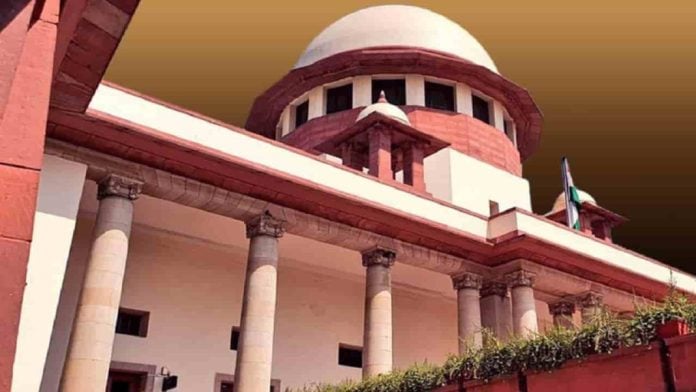The Supreme Court on Monday came down heavily on the State Bank of India for being selective, while submitting details of the electoral bonds to the Election Commission.
The order was passed by the Bench of Chief Justice of India (CJI) DY Chandrachud, Justice Sanjiv Khanna, Justice B R Gavai, Justice J B Pardiwala and Justice Manoj Misra, while hearing a petition alleging that SBI not furnishing unique numbers of electoral bonds to the Election Commission.
The Bench ruled that SBI cannot be selective and has to disclose all conceivable electoral bond details in its possession, including unique bond numbers that would disclose the link between the buyer and the recipient political party.
The Apex Court further directed SBI to disclose all information related to the Electoral Bonds which was in possession of the bank.
The SBI Chairman was further directed to file an affidavit by 5 pm of March 21, stating that it has not suppressed any information.
Appearing for SBI, Senior Advocate Harish Salve apprised the Bench that if the numbers of electoral bonds were to be given, it would comply with the court orders.
Appearing for the Centre, Solicitor General Tushar Mehta argued that the ultimate aim was to curb black money and the Apex Court must know how this judgment was being played outside the court.
He contended that witch-hunting has started on another level and not at the level of the Central government. Those before the court have started giving press interviews and deliberately embarrassing the court. A series of social media posts, at least intended to cause embarrassment, have started, he added.
The SG further requested the Apex Court to consider issuing directions in this regard.
The CJI observed that as judges, they were only on the rule of law and worked as per the Constitution. This court was only to work for the governance of the rule of law in this polity. As judges, they were also discussed in social media but their shoulders were broad enough to take this. The Apex Court was only enforcing its directions of the judgment, he added.
Earlier on Sunday, a petition was filed in the Supreme Court seeking disclosure of the details of electoral bonds sold from March 1, 2018, to April 11, 2019, including the alphanumeric number, date of purchase, denomination, and names of donors & parties to the ECI.
The plea contended that once the entire Electoral Bond Scheme was held to be violative of Article 19(1)(a) of the Constitution, the citizens were entitled to know the details of the donor and donee of the entire period from March 2018 onwards (the date when the scheme became functional).
It said the data available on the platform of the Election Commission represented only 76 percent of the total bonds and the voters were not aware of the details of the remaining 24 percent of the Electoral Bonds.
Represented by Senior Advocate Vijay Hansaria and Advocate Sneha Kalita, the petition submitted that the cut-off date of April 12, 2019, was relevant only for furnishing information by political parties to the Election Commission as an interim arrangement when the matter was sub-judice before the Supreme court.
Once this court struck down the entire Electoral Bond Scheme and the amendments to the Representation of the People Act, 1951, the Companies Act, 2013 and the Income Tax Act, 1961 by the Finance Act, 2017, in its February 15 verdict, the voters were entitled to know the funding to the political parties by the Electoral Bond for the entire period.
Another petition filed by the Citizen’s Rights Trust submitted that 9,159 bonds worth Rs 4,002 crore have been sold between March 2018 to April 2019, which should also be disclosed.
SBI was directed to submit the details of the bonds purchased from April 12, 2019, to February 15, 2024 to the ECI by March 6. The bank sought extension of time till June 30 to furnish the details. However, the Supreme Court refused to consider the request and ordered the bank to disclose the details by the close of business hours on March 12.


